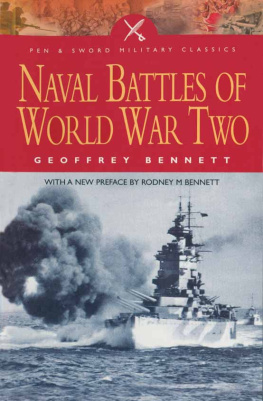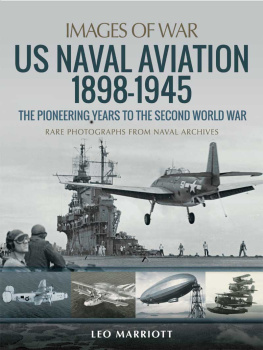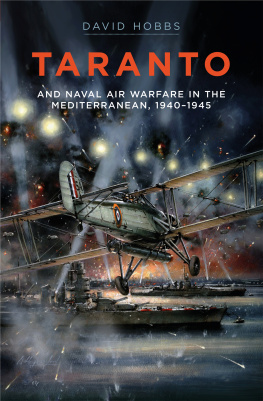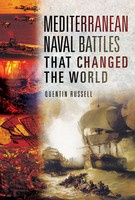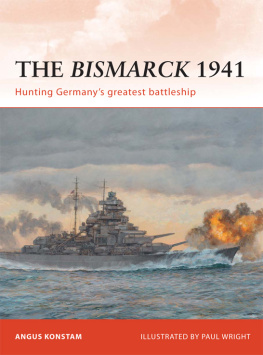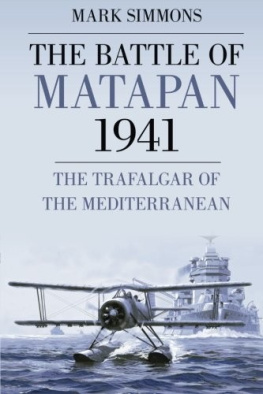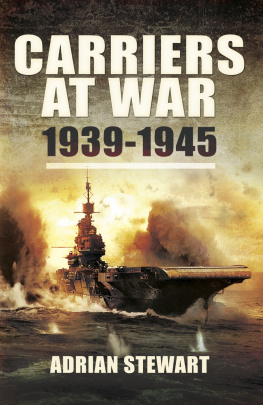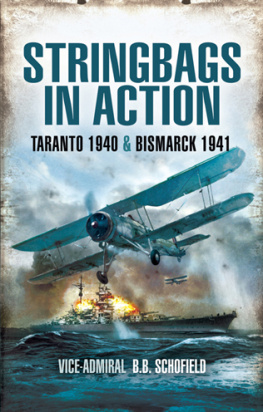NAVAL BATTLES OF WORLD WAR TWO
Also by Geoffrey Bennett
By Human Error
Coronel and the Falklands
Cowans War, British naval operations in the Baltic 1919, republished in 2002 as Freeing the Baltic
The Battle of Jutland, published in Germany as Die Skagarrak Schlacht (trans: R. K. Lochner)
Charlie B, a biography of Admiral Lord Charles Beresford
Naval Battles of the First World War
Nelson the Commander
Battle of the River Plate
The Loss of the Prince of Wales and Repulse
The Battle of Trafalgar
NAVAL BATTLES OF
WORLD WAR TWO
Geoffrey Bennett
Additional material on Enigma by
Rodney M. Bennett
Foreword by
Admiral Arleigh Burke USN
First published in Great Britain in 1975 by B.T. Batsford Ltd
Published in 2003 and reprinted in 2004, in this format, by
P E N & S W O R D M I L I T A R Y C L A S S I C S
an imprint of
Pen & Sword Books Limited
47 Church Street
Barnsley
S. Yorkshire
S70 2AS
Geoffrey Bennett, 1975, 2003, 2004
ISBN 0 85052 989 1
The right of Geoffrey Bennett to be identified as Author of this work has been asserted by him in accordance with the Copyright, Designs and Patents Act 1988.
A CIP record for this book
is available from the British Library
All rights reserved. No part of this book may be reproduced or transmitted in any form or by any means, electronic or mechanical including photocopying, recording or by any information storage and retrieval system, without permission from the Publisher in writing.
Printed and bound in England by
CPI UK
Pen & Sword Books Ltd incorporates the imprints of
Pen & Sword Aviation, Pen & Sword Maritime, Pen & Sword
Military, Wharncliffe Local History, Pen and Sword Select, Pen and
Sword Military Classics and Leo Cooper.
For a complete list of Pen & Sword titles please contact
PEN & SWORD BOOKS LIMITED
47 Church Street, Barnsley, South Yorkshire, S70 2AS, England
E-mail: enquiries@pen-and-sword.co.uk
Website: www.pen-and-sword.co.uk
For ADMIRAL OF THE FLEET SIR ALGERNON WILLIS
GCB, KBE, DSO
on whose staff I had the honour to serve
during a significant part of the Second World War
Contents
I am much indebted to the following for reading the manuscript of this book in whole or in part, and for their invaluable advice: Admiral Arleigh Burke, USN, Dr. J. E. de Courcy Ireland, Captain W. R. Lapper, RN, Captain Donald Macintyre, RN, Douglas H. Robinson, MD, and Captain Stephen Roskill, RN. They have helped me to avoid errors of fact, false interpretations and wrong-headed judgements. For such as remain, or with which the reader is unable to agree, I alone am responsible.
I have also to thank the respective authors, publishers, etc., for permission to quote from the following works: War Memoirs by Admiral of the Fleet Sir Algernon Willis (private and unpublished); The Two-Ocean War by Samuel Eliot Morison (Little, Brown & Co., Boston, Mass.); Wings of the Morning by Ian Cameron (David Higham Associates and Hodder & Stoughton, London); Everymans History of the Sea War by A. C. Hardy (Nicholson & Watson, London); Enemy in Sight by Esmond Knight, in Tales of the Fighting Navy (William Blackwood & Sons, London); The Bismarck Episode by Captain Russell Grenfell (David Higham Associates and Faber & Faber, London); The Second World War by Winston S. Churchill (Cassell & Co., London and Houghton Mifflin Co., Boston, Mass.); The Sinking of the Scharnhorst by R. B. Ramsden, in Sea Tales from Blackwood (William Blackwood & Sons, London); A Sailors Odyssey by Admiral of the Fleet Viscount Cunningham of Hyndhope (Hutchinson & Co., London), by permission of the authors Estate; Battle of Matapan by S. W. C Pack, and Battle of the Atlantic by Donald Macintyre (both B. T. Batsford, London); and The War at Sea, 19391945 by Captain S. W. Roskill (H.M. Stationery Office, London; Crown copyright).
The sheer quantity of the records of World War Two now available, and the great number of books which have been written about its naval side during the past 30 years (not only in English but in French, German, Italian and Japanese), are such that a comprehensive bibliography would require a volume to itself, whilst a select one would involve an invidious task. None has therefore been included in this book. But two indispensable works must be mentioned: The War at Sea, 193945, by Captain S. W. Roskill, DSC, RN, published in four volumes by HM Stationery Office, London, and History of the United States Naval Operations in World War II, by Samuel Eliot Morison, published in fifteen volumes by Little, Brown & Co., New York.
GEOFFREY BENNETT
LUDLOW 1975
* * *
The Author and Publishers wish to thank the following for permission to reproduce the illustrations in this book: Authors collection (4, 5); Imperial War Museum (13, 712, 1418, 2023, 2531, 38, 39); National Maritime Museum (6); Press Association (13); US Navy Department (19, 24, 3237).
whose brilliant handling of Destroyer Squadron 23 during the Solomons campaign, 194243, won him the nickname 31-knot Burke, who was Chief of Staff to the Admiral Commanding Task Force 58 during the later part of World War Two in the Pacific, and who crowned some forty years service in the United States Navy with the appointment of Chief of Naval Operations, 195561.
This book will be intensely interesting to any person who is at all curious about naval warfare. It will be or at least it should be absorbing for all men who may find themselves in positions with command responsibility in the future. It will bring back poignant memories to those who have already participated in naval battles.
This book is valuable because it is written with an insight into naval operations which can be acquired only with experience in battle. Captain Bennetts long service in the Royal Navy has given him the background to assess correctly the causes for success or failure in the naval engagements he describes.
He has brought out clearly the elements that are needed for a Navy to meet its responsibilities. It takes years to build a ship and it must operate for several decades. An erroneous concept, a faulty design in a weapons system, may very well cause failure in battle and possibly the loss of a war. By the examples he recounts he has shown the need for effective organisation of a Navy so that proper routines can be established in peacetime that will become automatic in war and will work in war.
He has demonstrated the value of intelligence and the necessity for quick, accurate analysis of the scarce information available and the importance of its rapid dissemination to commanders who can do something about it and the grievous misfortunes that too frequently occur when information is misinterpreted by, or withheld from, the operating commander. He has shown the absolute need for professionalism throughout the Navy for it to operate effectively in war. There must be knowledge, experience and skill in all ranks and ratings from the commander-in-chief to an ammunition passer. Each man must know thoroughly his own job and those of his associates, so that everybody knows what the ship or unit can do, and be able to depend on it doing what it should amid the stress and casualties of battle.
Next page
